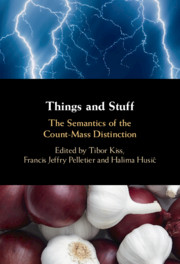Book contents
- Things and Stuff
- Things and Stuff
- Copyright page
- Dedication
- Contents
- Figures
- Tables
- Contributors and their Affiliations
- Preface
- 1 Editorial Introduction: Background to the Count–Mass Distinction
- Large-Scale Architectures for Count and Mass
- 2 Mass vs. Count: Where Do We Stand? Outline of a Theory of Semantic Variation
- 3 Counting, Plurality, and Portions
- 4 Count–Mass Asymmetries: The Importance of Being Count
- 5 Divide and Counter
- Implications from Individual Languages
- Compositional Analyses and Theoretical Issues
- New Empirical Approaches to the Semantics of the Count–Mass Distinction
- References
- Language Index
- Subject Index
2 - Mass vs. Count: Where Do We Stand? Outline of a Theory of Semantic Variation
from Large-Scale Architectures for Count and Mass
Published online by Cambridge University Press: 21 May 2021
- Things and Stuff
- Things and Stuff
- Copyright page
- Dedication
- Contents
- Figures
- Tables
- Contributors and their Affiliations
- Preface
- 1 Editorial Introduction: Background to the Count–Mass Distinction
- Large-Scale Architectures for Count and Mass
- 2 Mass vs. Count: Where Do We Stand? Outline of a Theory of Semantic Variation
- 3 Counting, Plurality, and Portions
- 4 Count–Mass Asymmetries: The Importance of Being Count
- 5 Divide and Counter
- Implications from Individual Languages
- Compositional Analyses and Theoretical Issues
- New Empirical Approaches to the Semantics of the Count–Mass Distinction
- References
- Language Index
- Subject Index
Summary
I will illustrate and discuss the extent to which grammars may vary vis-à-vis the mass/count distinction with three main phenomena and use this as a springboard for outlining a theory of semantic variation, with a universal logical basis. The first form of variation concerns the most widespread empirical test associated with the mass/count distinction, namely how noun phrases (NPs) combine with numerals. The second is that of the so called ‘fake’ mass nouns (like furniture). The third concerns alternations between mass vs. count interpretations of nouns like beer or chicken.
Keywords
Information
- Type
- Chapter
- Information
- Things and StuffThe Semantics of the Count-Mass Distinction, pp. 21 - 54Publisher: Cambridge University PressPrint publication year: 2021
Accessibility standard: Unknown
Why this information is here
This section outlines the accessibility features of this content - including support for screen readers, full keyboard navigation and high-contrast display options. This may not be relevant for you.Accessibility Information
- 12
- Cited by
